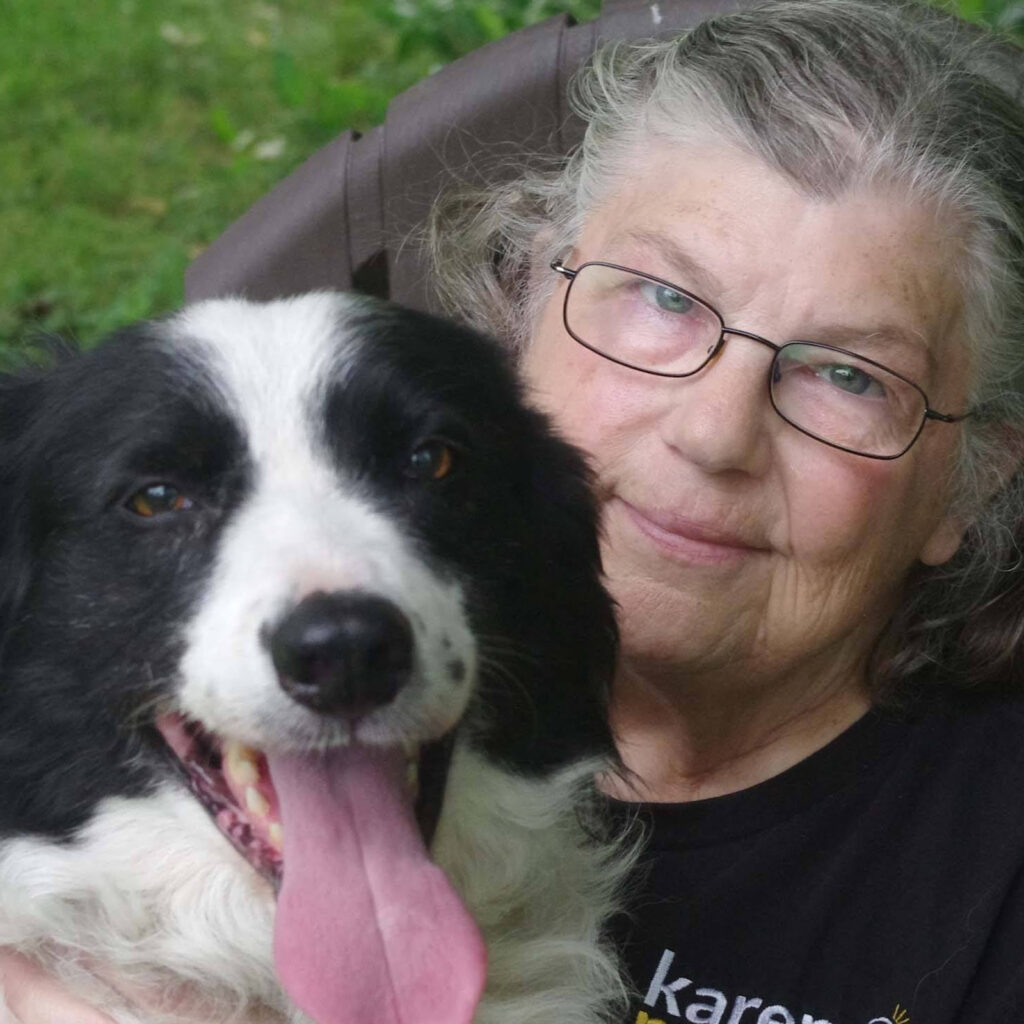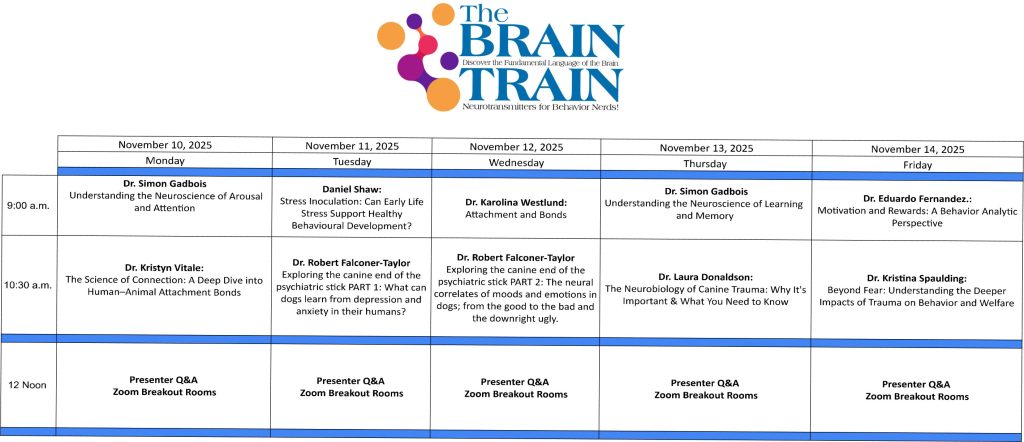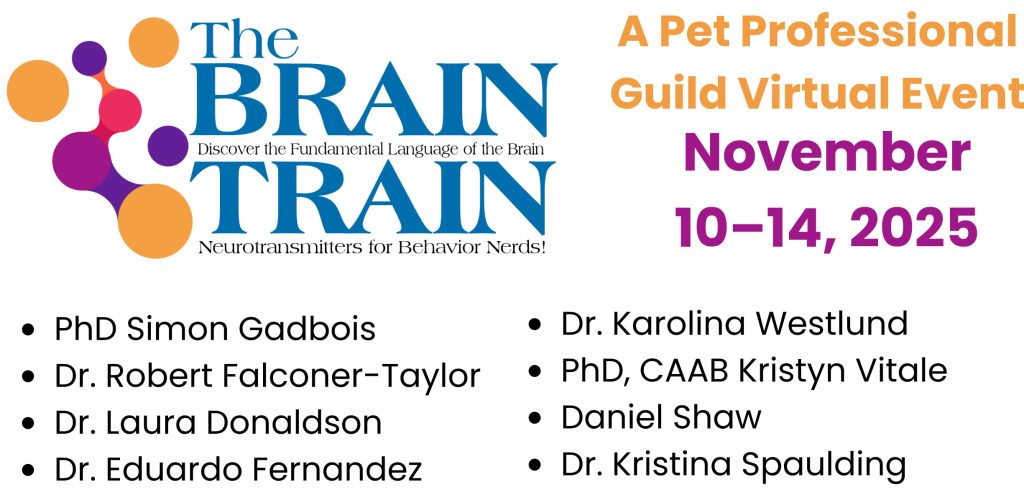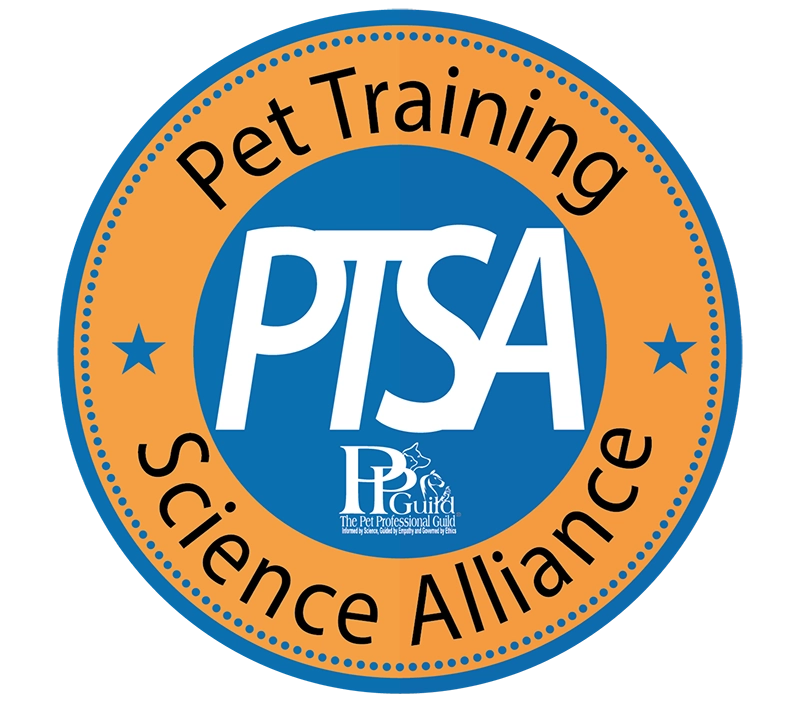The Brain Train – A PPG Virtual Event

Discover The Fundamental Language of The Brain – Neurotransmitters for Behavior Nerds
Please scroll down to view your presenters, the schedule, and the session guide
A Pet Professional Guild Virtual Event
November 10–14, 2025
Pet Professional Accreditation Board – 15, CCPDT – 5 CEUs for Trainers and 10 CEUs for Behavior Consultants. Pat Miller Academy 12, KPA 15. IAABC 15
Why Learn About the Brain?
Why are neurotransmitters so crucial, and why do I need to understand more about them?
Neurotransmitters are essential to learning and behavior because they serve as the chemical messengers that allow neurons (nerve cells) to communicate with one another throughout the brain and body. This communication forms the basis of all brain functions, from basic physiological processes to complex cognitive abilities and emotional responses.
Come and learn the impact of neurotransmitters on:
- Mood and emotions
- Motivation and reward
- Arousal and attention
- Learning and memory
- Anxiety and relaxation
- Sleep and appetite
- Attachment and bonds
You’ll also learn how specific neurotransmitters affect behavior and how imbalances and disorders of neurotransmitter systems contribute to depression and anxiety in pets.
Event Details
- Five days: November 10, 11, 12, 13, and 14, 2025
- Ten one-hour presentations—two each day at 9:00 a.m. and 10:30 a.m.
- Each day at Noon, the morning sessions will be followed by structured, scientist-led group discussions in breakout rooms on Zoom to facilitate “how to apply the knowledge.”
- Cost: $180 ($150 for PPG members—grab your discount code in the Member Area.)
- Your ticket provides access to all live sessions across the five days, as well as 12 months of access to the recording stage.
Payment Plans
A payment plan allows you to pay your event registration in five low monthly installments. Here’s how it works:
- Choose your payment plan below.
- Follow the instructions to set up your payment plan subscription. (PPG members, your discount is automatically applied to your payment plan.)
- You will receive an email with your subscription confirmation and event code.
- Register for the event. Enter your event code in the “Coupon Code” area of the registration page to bypass the payment process.
- After you register, you will receive a confirmation email with Zoom links for attending the event.
Payment Plan: Virtual Brain Train – General Public
$36.00
Payment Plan: Virtual Brain Train – PPG Member
$30.00
Your Presenters
Dr. Robert Falconer-Taylor
BVetMed, DipCABT, MRCVS
Dr. Robert Falconer-Taylor, BVetMed, DipCABT, MRCVS
Robert has worked in the veterinary profession for nearly 30 years, as a partner in an innovative small animal hospital group and as a locum. Alongside his role in day-to-day clinical medicine, Robert has also been very much involved in the management, communication, and education side of veterinary practice. During this time, he was directly involved in the conception and implementation of computerisation into the profession. This included a cross-fertilisation with the human healthcare system in the UK and the development of cross-platform coding and classification systems for disease identification, tracking, and surveillance. This is now an integral part of the World Health Organisation’s One Health initiative.
CURRENT ROLES
Academic advisor for the Association of INTODogs community
Scientific advisor and educator for the Pet Remedy Company (companion animal behaviour and welfare)
Trustee and veterinary advisor for Springer Rescue for Scotland charity
International consultant to the pet industry: development and risk assessment of pet ‘toys’ targeting and promoting the welfare of pets and their relationships with their guardians; development of practical and easy-to-use mood state assessment tools for dogs, cats, and horses
Active participating member of the social media–led ‘global companion animal community’
Robert’s current primary academic interests include companion animal cognitive science and emotionality, nutrition and its effects on behaviour, and applied neurophysiology, pharmacology, and therapeutics in companion animal behaviour therapy.
FORMER ROLES
Robert was also veterinary director and head of education of the Centre of Applied Pet Ethology (COAPE), the first organisation in the UK to develop government-regulated courses to degree level specifically in companion animal behaviour and training. COAPE also developed the renowned EMRA system used by behaviourists and trainers all over the world, now summarised in their book, EMRA Intelligence: The Revolutionary New Approach to Treating Behaviour Problems in Dogs.
Dr. Kristyn Vitale
PhD, CAAB, Cat Behavior, Science, and Training
Dr. Kristyn Vitale an internally recognized expert in cat behavior and cognition. Vitale received a Master of Environmental Science from Miami University (USA) where she studied free-ranging cat social behavior and a Ph.D. in Animal Science from Oregon State University (USA) where she studied cat social cognition and cat welfare. During her graduate career she was a National Science Foundation Graduate Research Fellow and a Visiting Research Fellow at Kyoto University (Japan). Vitale’s research interests include cross-cultural comparisons of human-animal interactions, factors that impact animal social behavior, human-animal attachment relationships, animal learning and training, and ways to improve the welfare of captive and companion animals. Vitale’s main area of expertise is focused on cat social behavior, human-cat interactions, and the impact of life experiences, such as cat training and socialization classes, on cat cognition and the cat-human relationship. She has published in peer-reviewed journals such as Current Biology, Animal Cognition, and Applied Animal Behaviour Science and published academic book chapters in textbooks such as the Clinical Handbook of Feline Behavior Medicine and Feline Behavior and Welfare. Kristyn is also an active public speaker and is frequently invited to speak to professional and academic audiences as well as public audiences of all ages. Her work has been internationally featured in media outlets such as Science and National Geographic and in film documentaries such as How the Cat Conquered the World (ARTE France) and Inside the Mind of a Cat (Netflix). She is currently a Certified Applied Animal Behaviorist at Maueyes where she focuses on cat science and education.

Dr. Laura Donaldson
Certified Trauma Professional, CDBC, KPA CTP
Dr. Laura Donaldson is a retired Ivy League professor (Emeritus, Cornell University) who has also been a dog trainer and canine behavior specialist for over 15 years. She holds a PhD in interdisciplinary humanities (her favorite course to teach was called “Gone to the Dogs: The Canine in Literature and Culture”) and has done graduate work in applied animal behavior. She is a certified dog behavior consultant through the IAABC; a Karen Pryor certified training partner; and a certified Control Unleashed instructor.
Laura owns Four Paws, Four Directions Dog Training & Behavior Consulting LLC, located in the Finger Lakes region of Ithaca, New York. In her currently full-time behavior consulting practice, she focuses almost exclusively on dogs struggling with dog-dog and dog-human–directed aggression issues. She teaches both in-person and online Control Unleashed classes.
She is also a published writer on dog behavior and is very proud that her essay, The Cognitive Revolution and Everyday Dog Training: The Case of Look at That, won the 2018 Maxwell Medallion Award for best magazine article on dog training and behavior. This article, along with several others, is part of a forthcoming book titled, Slow Thinking Is Lifesaving for Dogs™: New Approaches for Canine Aggression. Laura’s aim in this book is to bring the emergent research on canine cognition to the everyday practices of dog training, and particularly of canine aggressive behavior.
Laura lives with her husband and three dogs, and her background includes working Border Collies and a flock of Navajo Churro sheep.
Dr. Eduardo J. Fernandez
PhD, MS
Dr. Eduardo J. Fernandez is the Animal Behaviour Program Director and a Senior Lecturer of Applied Animal Behaviour and Welfare in the School of Animal and Veterinary Sciences at the University of Adelaide (Australia). Most of his work involves behavioral research applied to the welfare, enrichment, and training of zoo, aquarium, and companion animals. His general research focus is on animal welfare and the applied animal sciences, largely influenced by learning and evolutionary theories and perspectives. He currently runs the Exotic Enrichment and Learning (EEL) lab, which focuses on improving the lives of animals located in zoos, aquariums, and wildlife parks. Many of his past publications and presentations as well as current research can be found on his ResearchGate profile.
Dr. Karolina Westlund
PhD, ILLIS Animal Behaviour Courses
Dr. Karolina Westlund helps pet guardians and people working professionally with animals to get happier, reasonably well-behaved animals that thrive in the care of humans. She teaches animal behavior management through blog posts and the odd free short online course, as well as more extensive online courses. She is an associate professor of ethology at Stockholm University, Sweden, and sometimes publishes scientific articles related to enrichment, animal training, and well-being.
Daniel Shaw
BSc (Hons), MSc, CDBC
Daniel Shaw MSc, CDBC is an experienced animal behaviorist with extensive experiencing supporting dogs and cats with behavioral difficulties. As the owner of Animal Behaviour Kent (ABK), Daniel works with dogs and cats facing serious behavioral challenges, provides expert witness assessments for legal cases under the Dangerous Dogs Act, and has contributed to Parliamentary discussions on dog bite reform. With a master’s degree in neuroscience and background in psychology, Daniel bridges the gap between cutting-edge research and real-world applications, offering science-backed training programs that help both pets and their owners. His work has been featured on BBC Southeast Today, TalkTV, and LBC News, and he regularly teaches internationally on aggression, frustration, and trauma in dogs. Daniel also organizes the annual ABK Dog Behaviour Conference and runs ABK Learn, a platform offering accessible, science-based education in animal behavior, training, and neuroscience.

Dr. Simon Gadbois
PhD
Dr. Simon Gadbois is a researcher in animal behavior and animal learning and psychophysics at Dalhousie University in Halifax, Canada. He integrates biology (ethology), experimental animal psychology (psychophysics and learning), and neuroscience within a post-cognitivist perspective. A generalist, he has studied olfaction, learning/memory, and social behavior in species of mollusks (slugs and snails), fish (three species), reptiles (three species), birds (pigeons), and mammals (rats, dogs, red foxes, coyotes and wolves).
He has studied canids for 30 years and established the Canid and Reptile Behaviour and Olfaction lab at Dalhousie in 2006. His research on wild canids was focused on natural action sequences and social endocrinology. His current research on domestic dogs is mostly on applications of olfactory processing, including medical alert dogs and wildlife conservation canines.
Dr. Kristina Spaulding
PhD, CAAB
Dr. Spaulding brings over 25 years of expertise in dog training and behavior, blending scientific knowledge with hands-on experience. She holds a B.S. in Wildlife Ecology, a PhD in Biopsychology, and is a Certified Applied Animal Behaviorist. For 20 years, she worked directly with clients, addressing a range of behavior challenges. Now, she educates professionals on animal behavior through the Science Matters Academy of Animal Behavior LLC and speaks at conferences and events, bridging the gap between research and practice.
Her passion for teaching began during graduate school, where she was trained in effective teaching techniques and earned an award for Excellence in Teaching. Dr. Spaulding co-leads the Carefree Companion Certification Program with Irith Bloom, focusing on building resilience in animals through humane, science-based methods. She also teaches for the IAABC Foundation and Virginia Tech’s Animal Behavior and Welfare program.
Author of The Stress Factor in Dogs: Unlocking Resiliency and Enhancing Well-Being, her interests include stress, neurobiology, cognition, and well-being. Her dedication was recognized in 2019 with the APDT Member of the Year Award. Dr. Spaulding currently serves as Vice President of the IAABC Foundation Board. Reach her at sciencemattersllc.com or carefreecompanion.com.
Your Schedule

The Brain Train


